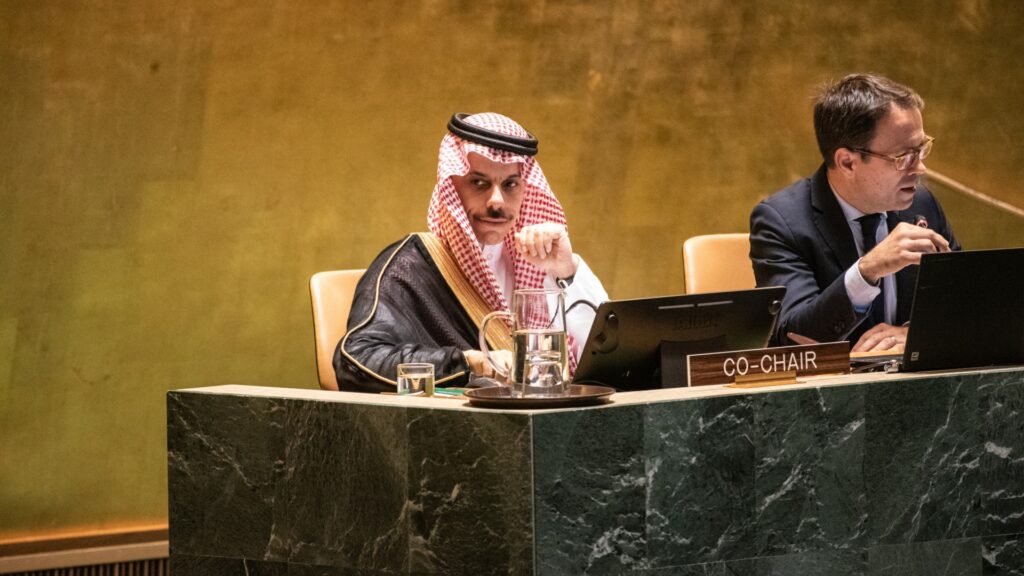Saudi Arabia plans to take a leading role in post-war Gaza by helping to disarm and marginalise Hamas and providing financial and logistical support to the Palestinian Authority (PA), an internal foreign ministry report seen by Middle East Eye reveals.
The kingdom intends to “support the deployment of an international peacekeeping mission in Gaza”, the report says.
Saudi Arabia has been suggested as a state that could contribute to such a force, alongside other Arab and Muslim-majority countries.
The document says it “aims to present the kingdom’s vision for enhancing stability in the Gaza Strip and the Palestinian territories”.
This will be done, the report says, “by marginalising the role of Hamas in governance” and reforming the PA “in a manner that serves the aspirations of the Palestinian people for an independent, sovereign state on the 1967 borders, with Jerusalem as its capital”.
New MEE newsletter: Jerusalem Dispatch
Sign up to get the latest insights and analysis on
Israel-Palestine, alongside Turkey Unpacked and other MEE newsletters
Saudi Arabia says Hamas has an “impact on obstructing peace efforts and deepening divisions” and therefore should be sidelined.
This can be done, the document says, through “progressive” disarmament “through international and regional agreements that guarantee neutrality”.
Gradually handing governance to the PA will also help reduce Hamas’s role in Gaza, the report says, suggesting “linking these efforts to the two-state solution”.

Gaza ceasefire: This is not a ‘new dawn’. The war is not over
Read More »
The document says this will be done in consultation with Egypt, Jordan and the PA, citing instructions from Manal bint Hassan Radwan, an increasingly influential foreign ministry official.
The Palestinian Authority has not had a presence in Gaza since 2007, when tensions over Hamas’ victory in legislative elections sparked clashes between the movement and Fatah, the party that dominates the PA.
According to the document, Saudi Arabia seeks institutional reforms of the PA to combat corruption, improve efficiency and ensure better representation of all Palestinian factions.
“Reforming the Authority is a fundamental pillar for achieving national unity and ensuring effective and transparent governance,” the report says.
The document says Saudi Arabia will provide financial and technical support to help the PA provide essential services to the Palestinian people. It does not say how much money it intends to contribute.
The report also calls for Palestinian national dialogue “to integrate factions under the umbrella of the Palestinian Authority, thus enhancing national cohesion”.
It says the kingdom would organise “regional workshops and conferences” to support the dialogue.
There is no mention of whether Hamas would be included. Israel is not referred to at all throughout the document.
Diplomatic push
The report is dated 29 September, the day after Saudi Foreign Minister Prince Faisal bin Farhan made a speech at the United Nations General Assembly calling for immediate international action to stop Israel’s genocide in Gaza.
Over the summer, Saudi Arabia and France pushed for a Gaza settlement that would end the genocide, which has killed more than 68,000 Palestinians, place an international security force in the enclave and establish Israeli-Palestinian dialogue.

Saudi and Emirati rulers’ Sharm el-Sheikh no-show reveals tensions with Egypt over Gaza
Read More »
Though ultimately US President Donald Trump rammed through his own ceasefire deal in early October, with the help of several Middle Eastern states, many elements of the Saudi-French proposal appear to have been included.
The ceasefire agreement, which Trump insists will end the war on Gaza, saw a prisoner exchange and a partial Israeli troop withdrawal.
Under the deal, Hamas is expected to disarm, which the movement’s officials have said will happen only when the Israeli occupations ends and there is an independent Palestinian state.
Trump met with the leaders of several major Arab and Muslim-majority countries on the sidelines of the UN General Assembly in September to discuss the ceasefire negotiations.
According to a senior Egyptian security source, Trump asked all of the countries present – Jordan, the United Arab Emirates, Indonesia, Pakistan, Turkey, Saudi Arabia, Qatar and Egypt – to contribute troops to the international peacekeeping force.
After the ceasefire began, Trump gathered world leaders in Egypt’s Sharm el-Sheikh for a summit on Gaza’s future. Saudi Crown Prince Mohammed bin Salman and UAE President Mohammed bin Zayed Al Nahyan were noticeably absent.
Egyptian, Saudi and Emirati sources told MEE that their absences reflected irritation that they were not playing as prominent a role in the agreement as they wanted to.
As the region’s wealthiest states, Saudi Arabia and the UAE are expected to foot the bill for much of Gaza’s humanitarian relief and reconstruction.
Smotrich rejects idea of Palestinian state
Washington is keen for Saudi Arabia to become the latest Arab state to establish open relations with Israel, as its Gulf allies the UAE and Bahrain did in 2021.
On Thursday, influential Israeli Finance Minister Bezalel Smotrich said his country should refuse any such deal with Saudi Arabia if it is done in exchange for a Palestinian state.
“If Saudi Arabia tells us that it is normalisation in exchange for a Palestinian state, then no thank you, my friends,” Smotrich said at a conference hosted by the Tzomet Institute.
“Keep riding your camels in the Saudi desert. We’ll continue to develop our economy, society, and state with all the great things we know how to do.”

